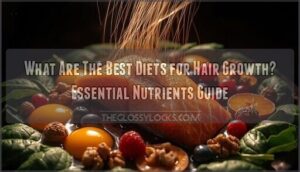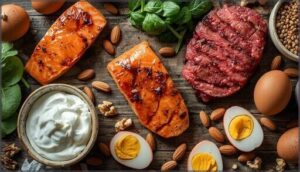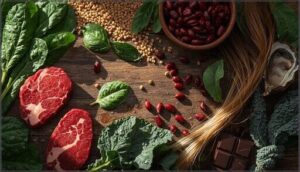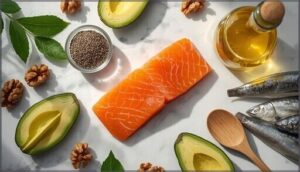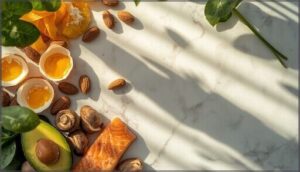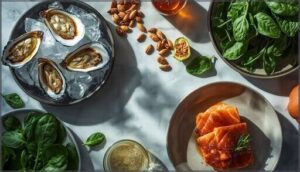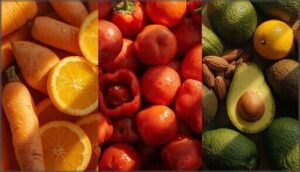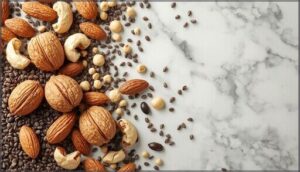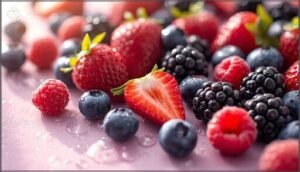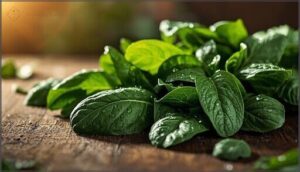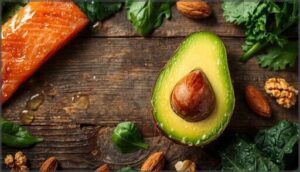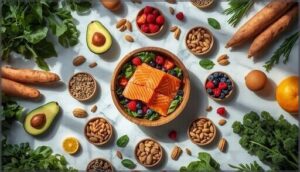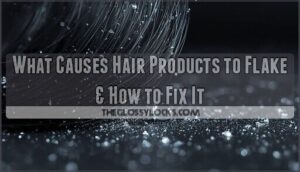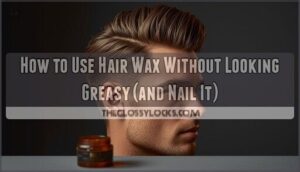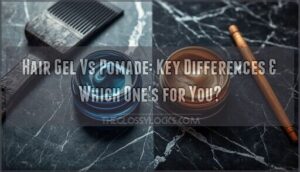This site is supported by our readers. We may earn a commission, at no cost to you, if you purchase through links.
Your hair follicles are tiny protein factories, churning out strands at a rate of about six inches per year—but only when they have the right raw materials. When essential nutrients run low, your body prioritizes critical organs over hair growth, and those factories slow down or shut off entirely.
The result? Thinning strands, increased shedding, and slower regrowth. The good news: targeted dietary changes can reverse nutrient deficiencies within weeks to months. By understanding which specific nutrients fuel hair growth and where to find them in whole foods, you can create a eating pattern that promotes stronger, healthier hair from the inside out.
Table Of Contents
- Which Nutrients Are Essential for Hair Growth?
- Best Protein Sources for Hair Health
- Iron-Rich Foods to Prevent Hair Loss
- Omega-3 Fatty Acids for Hair Growth
- Biotin: The Hair Growth Vitamin
- Zinc and Selenium for Healthy Hair
- Vitamins A, C, and E for Hair Strength
- Nuts, Seeds, and Legumes for Hair Growth
- Superfoods for Stronger, Thicker Hair
- Dietary Habits and Lifestyle Tips for Hair
- Frequently Asked Questions (FAQs)
- What can I eat to boost hair growth?
- What foods should I eat to promote hair growth?
- What vitamins are good for hair growth?
- Is chicken good for hair growth?
- What foods to eat for hair growth?
- What foods stop hair falling?
- How to boost hair growth?
- Which fruit is best for hair growth?
- How long does it take to see results?
- Can certain foods make hair loss worse?
- Conclusion
Which Nutrients Are Essential for Hair Growth?
Your hair needs specific nutrients to grow strong and healthy. Without the right building blocks, your follicles can’t produce the keratin proteins that make up each strand.
That’s why eating the right foods for hair growth makes such a noticeable difference in thickness and shine over time.
Let’s look at the key nutrients your body requires for ideal hair growth.
Protein
Your hair is roughly 90 percent keratin, a protein built from amino acids. Without adequate protein intake, your body can’t manufacture the keratin production your strands need, leading to protein deficiency that weakens hair strength.
Here’s what you should know about nutrition and hair growth:
- Aim for 0.8 grams of protein per kilogram of body weight daily
- Choose lean proteins like chicken, fish, and eggs for complete amino acids
- Spread protein across meals to maintain steady amino acid availability
- Include biotin-rich foods such as eggs and legumes for keratin support
- Prioritize whole food sources over supplements for best absorption
In addition to protein, you can further support your hair by including foods with.
Iron
Iron deficiency ranks among the most common nutritional causes of hair loss, particularly in women. Your red blood cells need iron to transport oxygen to hair follicles, and without adequate levels, follicles can’t function properly.
Iron-rich foods like lean red meat, spinach, and lentils support anemia prevention, while pairing them with vitamin C sources enhances iron absorption and strengthens your hair health foundation.
Research highlights the importance of micronutrients in hair loss and the need for a balanced nutritional approach.
Omega-3 Fatty Acids
While iron delivers oxygen, omega3 fatty acids nourish your scalp and follicles from within. Fatty fish like salmon and mackerel provide long-chain omega3s that reduce inflammation around hair roots, supporting healthier growth and shinier texture.
Three key benefits include:
- Enhanced follicle nourishment through improved blood flow
- Inflammation reduction that protects scalp health
- Improved hair density and strand strength
Most adults need 1.1 to 1.6 grams daily for ideal results.
Zinc and Selenium
Beyond omega3s, two trace minerals play commanding roles in your hair’s vitality. Zinc facilitates follicle repair and cell division, while selenium acts as an antioxidant shield against oxidative stress.
Deficiencies in either mineral can trigger thinning and brittle strands. You’ll find zinc in shellfish, meat, and legumes, with daily targets around 8 to 11 milligrams. For selenium, aim for 55 micrograms from Brazil nuts or seafood.
Biotin
This B vitamin strengthens your hair by supporting keratin infrastructure and protein metabolism. You’ll find biotin benefits in eggs, nuts, seeds, and certain vegetables—foods for hair growth that address nutrition and hair growth at the cellular level.
Severe biotin deficiency remains rare but can trigger thinning strands. Most people meet biotin dosage needs through varied diets without hair supplements unless a clinician identifies a true vitamin deficiency.
Vitamins A, C, and E
Your scalp relies on vitamin A to produce sebum, the natural oil that keeps hair follicles moisturized and primed for growth.
Vitamin C sources like citrus and bell peppers drive collagen production while boosting iron absorption for hair strengthening. Meanwhile, vitamin E role centers on antioxidant effects that shield follicle cells from oxidative damage, supporting overall nutrition.
Best Protein Sources for Hair Health
Your hair is made of keratin, a structural protein that requires a steady supply of dietary protein to maintain growth and strength.
Without enough protein, your body can’t build new hair fibers or repair damaged ones. Let’s look at the best animal and plant sources to fuel your hair’s protein needs.
Animal-Based Protein Foods
Meat benefits your hair by delivering concentrated protein alongside iron and zinc. Beef and chicken breast each provide about 26 grams of protein per 3-ounce serving. Fatty fish like salmon offer 22–25 grams of protein plus omega-3s.
Dairy sources including Greek yogurt and cottage cheese round out animal-based options. Eggs supply 6 grams of complete protein each, while oysters rank among the richest zinc sources.
Plant-Based Protein Foods
You don’t need meat to build strong hair. Legumes like beans and soybeans deliver 15 to 20 grams of protein per cooked cup, while tofu provides 10 to 20 grams per serving.
Quinoa offers complete protein at 8 grams per cup. Round out your plant protein with nuts and seeds (5 to 10 grams per ounce), plus spinach and avocados for added nutrients.
Protein’s Role in Hair Structure
Your hair is built on a keratin framework—this protein forms 80 to 90 percent of each strand by weight. Amino acids like cysteine create disulfide bonds that give hair strength and resilience, while methionine and lysine fuel keratin production during growth.
Consistent protein intake promotes longer growth cycles and thicker hair, though protein supplements aren’t necessary if your diet already provides complete amino acids.
Iron-Rich Foods to Prevent Hair Loss
Iron deficiency is one of the most common nutritional causes of hair loss, particularly in women. Your body needs iron to produce hemoglobin, which carries oxygen to your hair follicles and promotes the growth cycle.
Iron deficiency disrupts oxygen delivery to hair follicles, making it a leading nutritional cause of hair loss in women
Let’s look at the best iron sources to include in your diet and how to increase absorption.
Animal Sources of Iron
In the context of animal-based iron for hair growth promotion, heme iron benefits are clear—your body absorbs it far more efficiently than plant sources.
Red meat options like beef liver deliver about 6 mg per serving, while iron-rich fish such as oysters and sardines provide highly bioavailable iron. Organ meat sources offer concentrated nutrition to combat iron deficiency and support healthy follicles.
Plant Sources of Iron
For plant based iron, you’ll need to work a bit harder to meet your needs. Leafy greens like spinach deliver about 2.4 mg per 100 grams cooked, while lentils offer 3.3 mg. White beans top the list at 3.7 mg, and fortified cereals can provide 8–18 mg per serving—powerful tools against iron deficiency and mineral deficiency affecting hair growth promotion.
Iron Absorption and Vitamin C
Your body absorbs plant iron poorly unless you pair it with vitamin C boosters. Ascorbic acid drives ferric conversion to the absorbable ferrous form, improving intestinal absorption by two to three times.
Squeeze lemon over your spinach, toss bell peppers into your lentils, or sip orange juice with fortified cereal. These dietary enhancers help you dodge iron deficiency and support hair growth through better nutrition and antioxidants.
Omega-3 Fatty Acids for Hair Growth
Omega-3 fatty acids play a key role in reducing inflammation and supporting the health of your hair follicles. These essential fats help nourish your scalp and may strengthen hair strands from the inside out.
Here’s what you need to know about incorporating omega-3s into your diet for healthier hair growth.
Fatty Fish Benefits
Salmon, mackerel, and sardines deliver far more than omega-3 fatty acids for hair growth. These fatty fish provide extensive benefits:
- Heart health support by lowering triglycerides and blood pressure
- Brain function enhancement through EPA and DHA
- High-quality protein for hair structure and repair
- Inflammation reduction that aids joint care and scalp health
- Vitamin D and selenium for immune function and follicle activity
These benefits contribute to overall well-being, making them a great addition to a balanced diet.
Plant-Based Omega-3 Options
If you don’t eat fish, you can still obtain omega-3 fatty acids from various plant sources. Flaxseed benefits include 2.35 grams of ALA per tablespoon when ground, while chia seed oil and whole seeds deliver about 5 grams per ounce. Walnuts provide 2.5 grams per ounce, and hemp seeds offer 2.6 grams per 3 tablespoons.
Algal supplements deliver EPA and DHA directly, making them ideal for vegetarians and vegans.
| Food Source | Omega-3 Content | Key Benefits |
|---|---|---|
| Chia seeds | 5g ALA per ounce | Fiber and easy absorption |
| Flaxseed (ground) | 2.35g ALA per tablespoon | Lignans and antioxidants |
| Walnuts | 2.5g ALA per ounce | Protein and heart health |
How Omega-3s Support Hair
Your follicles depend on omega-3 fatty acids to stay strong and active. These fats deliver anti-inflammatory benefits that calm scalp inflammation and improve blood flow to hair roots, ensuring oxygen and nutrients reach each follicle.
- Support the hair growth cycle by maintaining a longer anagen phase
- Strengthen keratin structure for thicker hair shafts
- Boost scalp moisture through sebum production
- Augment nutrient synergy when paired with vitamin E
Biotin: The Hair Growth Vitamin
Biotin is a B-complex vitamin that plays a critical role in keratin production, the structural protein that forms your hair strands.
While true biotin deficiency is uncommon, inadequate intake can affect hair quality and growth cycles.
Understanding which foods provide biotin, recognizing deficiency signs, and knowing when supplementation might help can guide your dietary choices for healthier hair.
Biotin-Rich Foods
You can get dietary biotin from several nutritious diet staples. Egg yolks deliver about 10 micrograms per large egg, making them one of the best food sources for hair growth.
Sunflower seeds provide roughly 1.6 micrograms per ounce, while almonds and peanuts offer around 0.6 micrograms per serving. These food for healthy hair options support biotin benefits through regular meals, helping you maintain adequate nutrient intake without supplements.
Signs of Biotin Deficiency
Your body sends clear signals when biotin levels drop too low. A vitamin deficiency affecting this B vitamin can trigger noticeable changes you shouldn’t ignore.
Watch for these biotin deficit warning signs:
- Hair thinning or increased shedding, often appearing within weeks to months of nutrient deficiency
- Skin rashes with red scaly patches around your mouth, nose, and eyes
- Neurological signs like tingling in your hands and feet, muscle weakness, or unusual fatigue
These symptoms indicate your hair growth may be compromised by inadequate biotin intake.
Biotin Supplements
Most biotin supplements deliver 30 to 100 micrograms daily, though higher doses exist for specific deficiency treatment under medical guidance. You’ll find biotin in multivitamins or hair-focused formulas.
While generally safe, high-dose biotin can interfere with lab tests, so inform your doctor before bloodwork. For people without vitamin deficiency, supplementation rarely improves hair growth. Prioritize food sources first, then consider supplements if your healthcare provider identifies a genuine nutrient gap.
Zinc and Selenium for Healthy Hair
Zinc and selenium don’t get as much attention as protein or biotin, but they’re essential minerals that play critical roles in maintaining healthy hair growth.
Zinc promotes the hair growth and repair cycle, while selenium helps regulate thyroid hormones that influence your hair follicles. Understanding where to find these minerals, how they work, and what happens when you’re deficient can help you make informed dietary choices for stronger hair.
Top Food Sources of Zinc
Your diet plays a vital role in delivering the zinc your hair needs to thrive. Here are the top dietary zinc sources you should prioritize:
- Shellfish reign dominant – Oysters provide about 74 mg of zinc per 100 g serving, making them one of nature’s richest sources. Crab, shrimp, and mussels also contribute significant amounts.
- Red meat delivers consistently – Beef chuck roast supplies roughly 8.4 mg per 100 g, while lamb and pork offer 4.3 mg and 2.9 mg respectively.
- Plant-based options pack power – Pumpkin seeds and sesame seeds contain around 7–7.8 mg of zinc per 100 g, though plant zinc has lower bioavailability than animal sources.
Including these zinc-rich foods regularly helps prevent zinc deficiency, which can disrupt hair growth cycles. If you’re concerned about meeting your needs through diet alone, talk to your healthcare provider about whether zinc supplements make sense for you.
Selenium’s Role in Hair Growth
Selenium acts as a protective shield for your hair follicles, defending them against oxidative stress through antioxidant effects. This trace mineral promotes scalp health by regulating thyroid hormones that control your hair growth cycles.
Selenium benefits extend to reducing inflammation and maintaining follicle function. You’ll find selenium in seafood, whole grains, and Brazil nuts—small dietary factors that make a measurable difference in hair health and nutrient balance.
Deficiency Risks
When your zinc or selenium intake falls short, you’ll notice distinct deficiency symptoms that go beyond the scalp.
Zinc deficiency triggers hair loss patterns like diffuse shedding and patchy alopecia areata, while low selenium disrupts thyroid function and follicle health.
These dietary insufficiencies create a nutrient imbalance with real health consequences, making adequate mineral intake non-negotiable for maintaining your hair’s growth cycle.
Vitamins A, C, and E for Hair Strength
Vitamins A, C, and E each play distinct roles in maintaining hair strength and supporting the growth process.
These fat-soluble and water-soluble nutrients work through different mechanisms—from sebum production to collagen synthesis to antioxidant protection.
Understanding which foods deliver these vitamins helps you build a diet that supports multiple aspects of hair health.
Foods High in Vitamin A
Your scalp relies on vitamin A to produce sebum, the natural oil that keeps hair moisturized and healthy.
Sweet potatoes deliver about 40,000 IU per medium baked potato, while carrots provide 835 micrograms retinol activity equivalents per cup cooked. Dark leafy greens like kale offer 885 micrograms per cup.
These beta carotene-rich foods convert to retinol in your body, supporting hair growth without risking vitamin A deficiency.
Vitamin C for Collagen Production
Your body can’t build strong collagen fibers without vitamin C. This nutrient acts as a cofactor for enzymes that create stable cross-links in collagen fibers, supporting hair follicle health from the inside out.
You’ll find it in citrus fruits, bell peppers, and strawberries. A single orange delivers about 70 milligrams, meeting most of your daily requirement for sustained collagen synthesis.
Antioxidant Effects of Vitamin E
Vitamin E stands as your primary fat-soluble antioxidant, protecting cell membranes from oxidative damage. It scavenges harmful free radicals before they trigger chain reactions that destroy the fatty acids in your hair follicle cells.
Vitamin E Benefits for Hair:
- Shields follicle membranes from lipid peroxidation and oxidative stress
- Works with vitamin C to sustain antioxidant defenses
- Reduces free radical damage that weakens hair structure
- Prevents nutrient deficiency-related hair thinning
- Promotes healthy blood flow to your scalp
Nuts, Seeds, and Legumes for Hair Growth
Nuts, seeds, and legumes pack serious nutritional power for your hair. They’re loaded with protein, healthy fats, vitamins, and minerals that support growth from the inside out.
Here’s what you need to know about each category.
Best Nuts for Hair Health
Nuts pack powerful nutrients your hair needs to thrive. Almonds deliver vitamin E and biotin that protect follicles from oxidative stress while supporting shine. Walnuts offer plant-based omega-3s for scalp conditioning.
Cashews provide zinc for follicle function, and just one Brazil nut supplies your daily selenium requirement. Peanuts contribute protein and B vitamins essential for keratin production and hair strength.
Seeds That Support Hair Growth
Small but mighty, seeds deliver concentrated nutrients that strengthen hair from follicle to strand. Their omega benefits and vitamin E work together to protect your scalp health while boosting nutrient absorption.
- Flaxseeds and chia seeds provide plant-based omega-3s that nourish follicles and support hair shaft integrity
- Pumpkin seeds supply zinc to maintain normal follicle function and stem cell activity
- Sunflower seeds offer vitamin E and biotin for antioxidant protection and keratin production
Legumes as Protein and Iron Sources
Legumes pack a double punch for hair growth, delivering both protein and iron in a single serving. Lentils lead with 18 grams of protein and 6.6 milligrams of iron per cooked cup, while soybeans top the charts at 28 grams of protein. Your body absorbs this plant-based iron better when you pair legumes with vitamin C-rich foods like bell peppers or citrus.
| Legume | Protein (per cup, cooked) | Iron (per cup, cooked) |
|---|---|---|
| Soybeans | 28g | 8.8mg |
| Lentils | 18g | 6.6mg |
| Chickpeas | 15g | 4.7mg |
| Black Beans | 15g | 3.6mg |
Superfoods for Stronger, Thicker Hair
Some foods pack more nutritional punch per bite than others in terms of supporting hair health. These nutrient-dense options deliver multiple vitamins, minerals, and compounds that work together to strengthen hair from the inside out.
Here’s what you should add to your plate for the best results.
Berries and Antioxidants
Think of berries as your scalp’s defense squad against oxidative stress. Their polyphenol benefits and antioxidant power protect hair follicles from free radical damage that can slow growth.
- Blueberries deliver anthocyanins that reduce oxidative stress at the cellular level
- Strawberries pack 60-90 mg of vitamin C per 100 g to boost collagen synthesis
- Raspberries provide ellagic acid for complementary free radical protection
- Blackberries offer tannins supporting overall follicle health
- Regular berry nutrition strengthens hair growth promotion pathways naturally
Leafy Greens and Hair Health
You’re missing out on serious hair follicle health if leafy greens aren’t part of your nutritious diet. Spinach and kale deliver iron, folate, and vitamin A that support hair growth through enhanced sebum production and oxygen transport to follicles.
| Nutrient | Key Leafy Greens | Hair Growth Benefits |
|---|---|---|
| Iron | Spinach, Kale | Oxygen delivery to follicles |
| Folate | Collards, Turnip Greens | Cell division support |
| Vitamin A | Swiss Chard, Mustard Greens | Sebum balance |
| Vitamin C | Kale, Spinach | Collagen production |
Their antioxidants protect against oxidative stress while high water content promotes scalp hydration tips. Green smoothie recipes make these nutrient-dense diets accessible daily.
Avocado and Healthy Fats
Your hair follicles thrive on the monounsaturated fats found in avocados, which deliver about 10 grams per half fruit. Avocado benefits extend beyond direct hair nourishment—these healthy fats increase fat solubility of vitamins A and E during meals, boosting nutrient uptake critical for growth.
Pair avocado with fatty fish or leafy greens in your nutritious diet to optimize hair health through improved absorption and antioxidant protection.
Dietary Habits and Lifestyle Tips for Hair
What you eat matters, but how you eat can be just as important for maintaining healthy hair growth.
Your daily habits and overall approach to nutrition play a significant role in supporting your hair follicles from the inside out. Let’s look at three practical strategies that complement your nutrient-rich diet.
Staying Hydrated for Scalp Health
Beyond what you eat, staying hydrated promotes scalp health and hair follicles in ways many overlook. Aim for six to eight cups daily to maintain scalp moisture and hair elasticity. Water intake directly impacts your scalp’s ability to stay balanced and avoid dry scalp conditions that compromise hair growth.
- Drink water steadily throughout the day to keep follicles in an active growth phase.
- Pair hydration with water-rich foods like cucumbers and watermelon.
- Track your daily fluids to spot patterns linked to scalp dryness.
- Limit caffeine and alcohol, which increase fluid loss and disrupt hydration balance.
Avoiding Nutrient Deficiencies
Your body signals nutrient deficiency through more than just hair loss. Watch for brittle nails, fatigue, and slow wound healing—all warning signs of iron deficiency or zinc deficiency.
A single vitamin deficiency can trigger multiple symptoms, so track patterns in your energy levels and hair quality. Regular blood work catches mineral deficiency early, giving you time to adjust your dietary planning before hair thinning worsens.
When to Consider Supplements
Supplements for hair growth make sense after deficiency testing confirms specific nutrient gaps. Your doctor should evaluate blood work for vitamin deficiency or mineral deficiency before recommending dietary supplements.
Supplement timing matters—take iron separately from calcium, and fat-soluble vitamins with meals. Medical guidance ensures supplement safety, especially if you’re managing chronic conditions or taking medications that affect nutrient absorption.
Frequently Asked Questions (FAQs)
What can I eat to boost hair growth?
Want fuller, thicker strands? Focus on nutrient balance with protein-rich hair growth foods like fatty fish and eggs, plus vitamin C from sweet potatoes, biotin sources, and food supplements for a healthy scalp.
What foods should I eat to promote hair growth?
Focus on fatty fish for omega-3s and protein, eggs for biotin, sweet potatoes for vitamin A, spinach for iron and vitamin C, and nuts for zinc.
These nutrient-rich foods support hair growth naturally.
What vitamins are good for hair growth?
Your body builds what you feed it. Keratin production and collagen formation support stronger strands, while B vitamins and vitamin A maintain scalp health and reduce nutrient deficiency.
Biotin, vitamin C, and vitamin E support keratin production and collagen formation for stronger strands.
Is chicken good for hair growth?
Yes, chicken is excellent for hair growth. This lean meat delivers high-quality protein rich in amino acids essential for keratin production.
Chicken nutrition also provides iron, zinc, and vitamin B12 that support healthy hair follicles.
What foods to eat for hair growth?
You’ll want to prioritize fatty fish, eggs, sweet potatoes, berries, spinach, and nuts.
These nutrient-rich diets deliver protein, biotin, vitamin C, iron, and omega-3s that support healthy hair growth and scalp care.
What foods stop hair falling?
Ironically, the foods that stop hair falling are the same ones that grow it—protein-rich eggs, iron-packed spinach, omega-3-loaded salmon, and zinc-rich oysters address nutrient deficiencies driving hair loss prevention.
How to boost hair growth?
Boost hair growth with nutrient balance: prioritize protein, iron, omega-3s, biotin, and vitamin C.
Pair healthy haircare habits like scalp massage with whole foods to support the growth cycle and strengthen your hair growth strategies naturally.
Which fruit is best for hair growth?
Citrus fruits like oranges and kiwis deliver vitamin C for collagen synthesis, while berries provide antioxidants protecting follicles.
Tropical options including avocados supply healthy fats, and stone fruits offer vitamins A and C supporting scalp health.
How long does it take to see results?
Visible improvements in hair growth usually appear after 2 to 4 months of consistent nutrient intake.
Result variations depend on your hair cycle, nutrient absorption, and initial deficiencies, with fuller strands emerging around 3 to 6 months.
Can certain foods make hair loss worse?
Your plate can work against you. Sugar impact and fried foods trigger inflammatory responses, while alcohol effects include impaired nutrient absorption.
Processed foods and inflammatory triggers may accelerate hair loss alongside vitamin deficiency.
Conclusion
The root of healthy hair growth isn’t found in expensive treatments—it’s on your plate. By consistently incorporating protein-rich foods, iron sources, omega-3s, and key vitamins into your meals, you’re giving your follicles the raw materials they need to thrive.
The best diet for hair growth isn’t a restrictive plan; it’s a balanced eating pattern that nurtures your entire body. Nourish yourself well, and your hair will follow.

